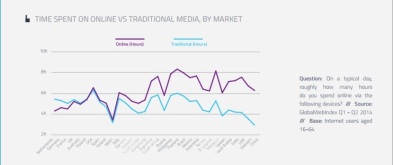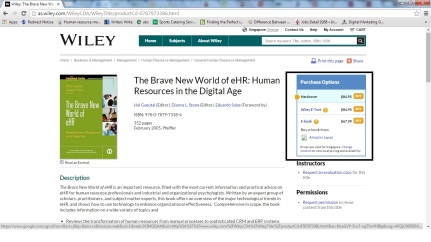Tags
As technology advances, the use of traditional media to obtain information have dwindled over the years and replaced by online content. The Figure below shows the time people spend online compared to traditional media.
Source: http://insight.globalwebindex.net/ (Digital vs Traditional Media Consumption Summary)
From the perspective of education, one of the problem we students faced when looking for information online is e-books that requires purchase. These are well-known authors and recommendation by Professors. It is frustrating for us having to fork out our own pocket-money to purchase something we may not need eventually.
An example of an E-Book I would like to use on HRM Assignment but was required to purchase.
Thankfully, institutions such as University of Southampton have linked with ScienceDirect which allows access to online materials using school login credentials.
Content-Producers objected using their works because of infringement to copyrights and licensing issues since they should be the one deciding whether the work should be open-access.
What authors should know is there are actually advantages of providing FREE online resources. Poor children in less-developed countries can receive high standard education and improve their economy and social aspect of lives. If the quality of your works are good, it can generate positive word of mouth and attract potential buyers to buy more of your works, and in the process earning more money and reputation. Also, as knowledge spreads, new theories and ideas can be generated to create something that benefits people.
Below shows the benefits of having open-access.
On the flip side, I will sympathize with the feelings of these content-producer because it undermines the effort they have put in – the time, money, invested and yet got no returns. Here are some examples of a few famous authors who took countless pains and efforts before getting their works accepted. In addition, online piracy adds fuel to the fire when people illegally download content online for free. This example of authors banding together to counter pirate E-Book site clearly shows their frustrations.
In conclusion, my thoughts is having unrestricted access of online materials for education with the government, institutions and non-profit organization funding for the license fee because we should not deprive opportunity for people to expand their knowledge. In this way, the interest of both parties are satisfied – students gets ALL information they want and content-producers gets their return. CLASS is a non-profit organization in Singapore that helps to protect the interest of owners of copyright materials and licensees. And also, we should always add reference in our report as a way to credit them for their work.
References
Anon, (2014). 1st ed. [ebook] GlobalWebIndex, p.4. Available at: http://insight.globalwebindex.net/hs-fs/hub/304927/file-1414878665-pdf/Reports/GWI_Media_Consumption_Summary_Q3_2014.pdf?submissionGuid=78487a74-bc3f-4dea-a5a3-7d9af08b229a [Accessed 9 Dec. 2014].
Class-singapore.com, (2014). The Copyright Licensing and Administration Society of Singapore. [online] Available at: http://www.class-singapore.com/Licencing.aspx [Accessed 9 Dec. 2014].
Sciencedirect.com, (2014). ScienceDirect – Login via your institution. [online] Available at: http://www.sciencedirect.com/science/externallogin [Accessed 9 Dec. 2014].
Staff, W. (2011). Famous Author Rejection Letters: Examples Of Famous Author Rejections. [online] Writer’s Relief, Inc. Available at: http://writersrelief.com/blog/2011/07/famous-author-rejection-letters/ [Accessed 9 Dec. 2014].
TeleRead: News and views on e-books, libraries, publishing and related topics, (2012). Authors band together to attack pirate e-book site –. [online] Available at: http://www.teleread.com/ebooks/authors-band-together-to-attack-pirate-e-book-site/ [Accessed 9 Dec. 2014].



Hi Yi Ming,
I go along with your points on openness in accessing to free online materials benefitting the less developed countries, generating positive word of mouth and publicity(Provided works are good) and on the other hand, authors and publisher’s painstaking fruits of labour. I really agree with that.
However after reading Simon’s post, I have learnt that on the long run,consumers will eventually have to bear certain cost or fees as relying on government or tax payer’s money will not be feasible. It is inevitable someone has to pay down the road.
Therefore, in your opinion, what do you think could be done?As we do not want to deprive those who are keen and willing to learn however due to financial circumstances are unable to do so. Let me know and great work!
Cheers,
Amanda
Hi Amanda,
Thanks for your agreement with how having open access can benefits people from the less-fortunate.
Well, in my opinion, taxpayers and government should plays a part in bearing the cost for providing free access because it benefits the country in terms of economy and society. There is a clear evidence to a high literacy rate leads to a wealthier country.
In this example, we see how the US government introduced laws that requires taxpayer funded research to be made open access : http://www.nature.com/news/us-science-to-be-open-to-all-1.12512
This is a classic example of what the government should do to ensure doors are not closed for those less-fortunate
Otherwise, i would suggest encouraging non profit organisation to help in the funding.